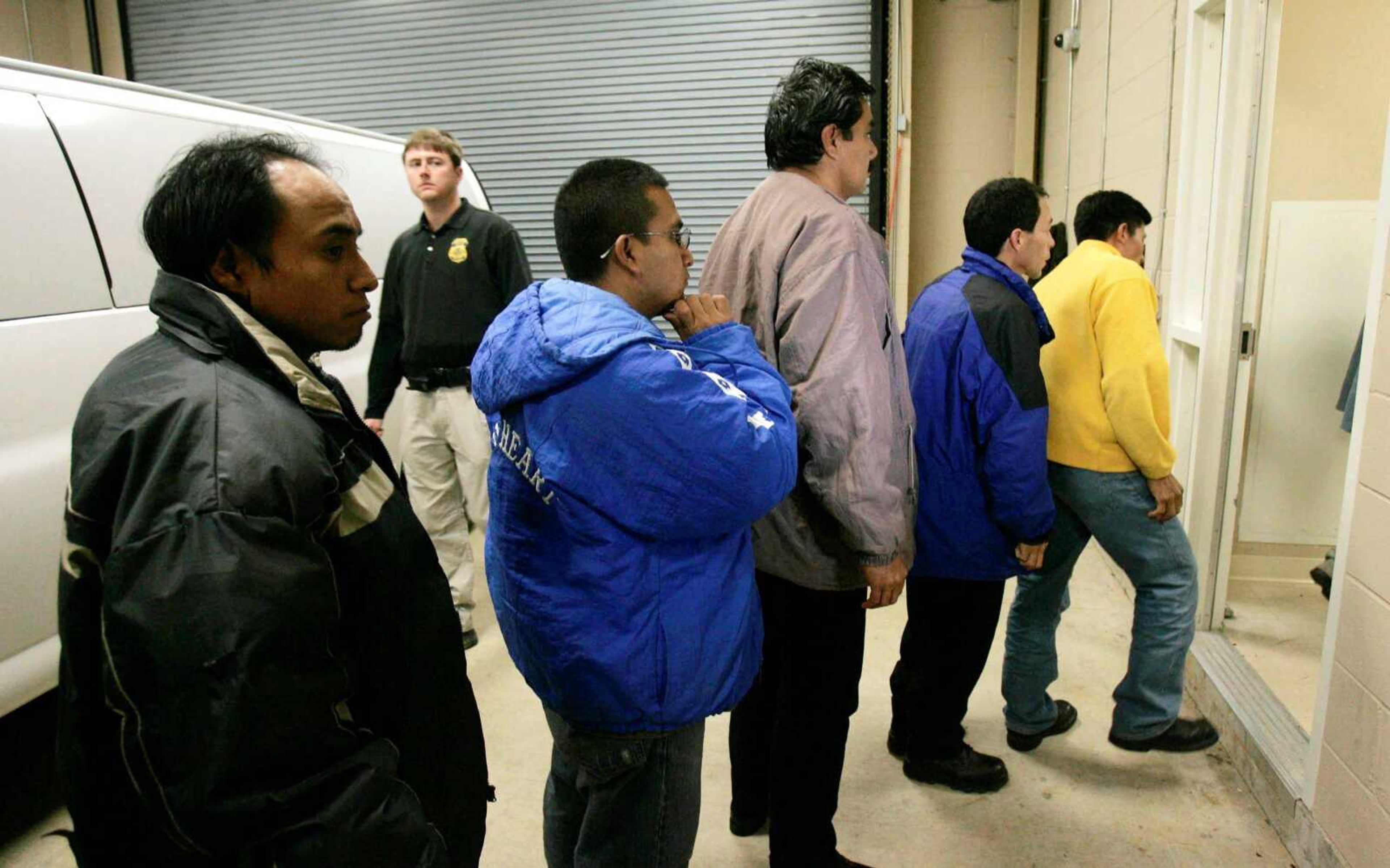In new tactic, Border Patrol agents target immigrant smuggling 800 miles from border
PEARL, Miss. -- Detective Nick McLendon, on stakeout duty along a dark stretch of eastbound Interstate 20, noticed a red Chevy Suburban with heavily tinted windows and no light over its rear Texas license plate. The missing light gave him all the excuse he needed to pull the sport utility vehicle over...
PEARL, Miss. -- Detective Nick McLendon, on stakeout duty along a dark stretch of eastbound Interstate 20, noticed a red Chevy Suburban with heavily tinted windows and no light over its rear Texas license plate. The missing light gave him all the excuse he needed to pull the sport utility vehicle over.
Packed into the Suburban, he discovered, were 14 illegal immigrants, two suspected smugglers, and a spiral notebook on the front seat, listing the passengers and their destinations in Spanish.
The arrests -- some 800 miles from the Mexican border -- represented a new and dramatic shift in U.S. immigration enforcement strategy.
Federal agents, with help from local law officers like McLendon, a Pearl detective, have begun intercepting illegal immigrants and smugglers along stretches of highway deep in the U.S. interior, where those who have slipped into the country usually have little chance of getting caught.
"They think they're pretty much home free once they get up here," said Bill Botts, the assistant chief patrol agent in charge of the Border Patrol's Gulfport, Miss., station. But Operation Uniforce, as the two-week crackdown begun Jan. 13 is called, "is pretty much a shocker for the smuggling organizations."
More than 300 immigrants and suspected smugglers had been arrested as of Tuesday, more than a week into the operation.
Interstate 20 has become a major corridor for immigrant smugglers. It peels off from I-10 in West Texas and runs across the South, passing through Atlanta and linking up with other major highways, including I-95, which leads to Miami to the south and Baltimore, Philadelphia, New York and Boston to the north.
About 40 Border Patrol and customs agents who normally work at or close to the border have been temporarily assigned to the crackdown. They and local law officers have spread out along several miles of I-20 and some of its connecting highways.
After two weeks are up, they will return to their usual jobs and evaluate what they learned. In the coming weeks or months, they may return and do it again.
The hope, though, is whether they come back or not, the crackdown will put immigrant smugglers on notice and disrupt their business by forcing them to take longer, slower and more costly detours.
Border Patrol spokesman Ramon Rivera said the vast majority of those caught in the crackdown are Mexicans headed to the East Coast, where they typically land jobs in agriculture, construction and manufacturing. Agents also found a Mexican who had paid a smuggler $400 to get him home to avoid a murder charge in Chicago.
But perhaps more important, the agents also uncovered vital information about a few prolific smuggling rings and a popular Texas stash house where immigrants were being kept after crossing the border.
"The intelligence we are getting is absolutely priceless," Rivera said.
The Border Patrol said it had no immediate estimate of the cost of Operation Uniforce.
Federal agents ran three such operations closer to the border last year: two in Baton Rouge, La., and one in Mobile, Ala. Those efforts seemed to force the smugglers north from I-10 to I-20. So this time, agents picked up and moved deeper into the interior to I-20, some 800 miles from the nearest border crossing, at Brownsville, Texas.
The Associated Press was allowed to document the operation during an nighttime ride-along last week in Mississippi.
On that night, McLendon, who normally pulls over motorists in a search for drugs, found the exhausted immigrants crammed in the Suburban, shoes off, a few blankets on the floorboards, a half-empty jug of water in the back. The passengers, including a girl of about 10, had crossed into the United States from Mexico near Nogales, Ariz., some 1,200 miles away from this Mississippi town.
It was unclear whether they sneaked across the open desert on foot, or passed through a border crossing station and then climbed into the SUV. But the Suburban had made it all the way from the border in Arizona -- a receipt in the vehicle showed that someone bought a new battery there on Wednesday -- and passed through Dallas on Thursday -- the driver stopped for an oil change about 1:30 p.m. -- before being stopped outside Jackson, Miss.
If McLendon had come across these immigrants a week earlier, he would have issued a ticket for the missing light and sent them on their way. The nearest fixed Border Patrol station is 160 miles away in Gulfport, and he wouldn't have called it because the agents wouldn't have made the three-hour trip for such a routine matter.
This time, Border Patrol agents posted along the highway promptly arrived on the scene, and all 16 people were arrested and held for deportation.
"When Border Patrol pulled up you could see the disappointment on their face, that they would be going all the way back," McLendon said.
Connect with the Southeast Missourian Newsroom:
For corrections to this story or other insights for the editor, click here. To submit a letter to the editor, click here. To learn about the Southeast Missourian’s AI Policy, click here.









